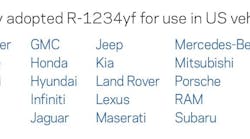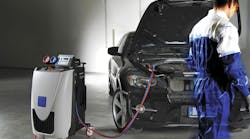The U.S. Department of Justice is reviewing a proposed termination of a judgement in United States v. Association of Casualty and Surety Companies, American Mutual Insurance Alliance and the National Association of Mutual Casualty Companies from November 27, 1963, more than 50 years ago. In recent years, this has been referred to as the 1963 Consent Decree. The focus of the 1963 Consent Decree was an Independent Appraisal Plan or Automotive Damage Appraisal Plan, which many view as a precursor to today’s direct repair agreements.
The Automotive Service Association (ASA) saw some correlation with this 1963 decision and a subsequent, new insurer program proposal in the mid-1990s. ASA leaders met with the top litigators at the U.S. Department of Justice (DOJ) to discuss the issue. DOJ was not encouraging as to the applicability of the 1963 Consent Decree to direct repair agreements. ASA followed with multiple discussions with the antitrust policy chief at DOJ with similar results.
In an effort to exhaust the issue, ASA held public (collision industry and trade press) discussions in Washington, D.C. and during NACE in Chicago. Important for these public meetings, ASA included antitrust counsel from the U.S. House Judiciary Committee, consumer group representation, outside antitrust counsel and others to discuss and answer questions relative to the applicability of the 1963 Consent Decree to insurer-repairer issues of the day.
ASA has recently discussed DOJ’s Consent Decree review with the leadership of the U.S. Senate who has contacted DOJ about the issue. DOJ has not made a final decision on whether to terminate the judgement or not.
Whatever the outcome of the DOJ review, several observations are important for collision repairers. First, if the decision is to keep the judgement in place, what happens next? Several previous reviews by democratic administrations demonstrated no encouragement for the Consent Decree resolving collision industry issues. Will this change in a republican administration? Finally, and most importantly, none of this addresses the insurer-repairer-consumer issues of today.
There are numerous collision repairer concerns that can be resolved today by policymakers who desire to help small businesses and consumers including the elimination of Most Favored Nation clauses in direct repair agreements, mandating the use and payment for OEM repair procedures, and others. These are real issues that impact collision repairers and consumers each day and are issues that can be resolved via industry dialogue or legislation. Legislation continued to struggle during the 2019 state sessions with the passage of New Hampshire House Bill 664, set to lead the way for OEM repair procedure legislation, only to have New Hampshire’s Governor Chris Sununu veto the bill. Although the legislature came close to a veto override, at the end of the day they fell short. The Governor’s veto message included the following: “This bill would increase the cost of auto insurance premiums by limiting the ability of insurers to negotiate what is reasonable in the repair process. The requirements outlined in this bill would introduce a significant disadvantage for smaller independent repair shops and could limit their ability to compete. This limits consumer choice and raises insurance rates without the corresponding increase in safety for our citizens.”
There are several messages in the Governor’s statement, i.e. limitations on insurers’ negotiating position; impact on smaller shops for making recommended, safe repairs; limitations on consumer choice; and insurance rates rising. All of these are indicative of the policy gap between consumers, repairers and policymakers as well as the amount of work necessary to bring these issues to resolution. As the poet Robert Frost, who attended college in New Hampshire, wrote so ably, “And miles to go before I sleep.”
As industry leaders, ASA and coalition partners will continue to strive to resolve today’s issues impacting collision repairers and consumers.

